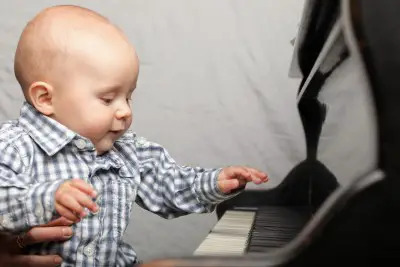During early childhood years, children develop at a faster pace than adults, and it is during this period of time that music education can impact a child’s learning ability and development as the executive director of The Diller-Quaile School of Music in Manhattan shares.
The years from newborn to age 6 are critical times for engaging in and incorporating music education in a child’s life. Children develop at a faster pace than adults during the early childhood years, and that period has been identified in literature as the “music babble” stage or primary music development.
Kirsten Morgan, the executive director at The Diller-Quaile School of Music in Manhattan, speaks about the benefits of music education and how parents can incorporate music into their child’s life.
 Music is a universal form of expression and communication that is inherent to all cultures. We believe that rich, socially interactive, sensitive, and nurturing interactive musical experiences positively affect young children’s lives and build a foundation from which all future learning may be flourished. Our young students at The Diller-Quaile Schoole of Music participate in music by actively listening, watching, and engaging in each experience we share with them.
Music is a universal form of expression and communication that is inherent to all cultures. We believe that rich, socially interactive, sensitive, and nurturing interactive musical experiences positively affect young children’s lives and build a foundation from which all future learning may be flourished. Our young students at The Diller-Quaile Schoole of Music participate in music by actively listening, watching, and engaging in each experience we share with them.
It’s important to remember that all children depend on their own experience in order to make sense of their evolving world. Musical and artistic experiences all offer emotional and sensorial means by which they may connect. These experiences all enhance future learning.
When you’re thinking about young children, they are developing at a rapid rate. More rapidly than at any other time in their life. Their brains are actively seeking experiences to build connections and to learn. Music provides ongoing opportunities for the brain to build strong connections and it’s very compelling for the young child. They are developing critical thinking skills, purposeful focus in their music experiences, problem-solving abilities, perseverance, and music making inspires us to think in new ways, express emotion, connect with others, and build community.
Kirsten Morgan joined The Diller-Quaile School of Music faculty in 1981 and became its executive director in 1998. She holds a bachelor’s in flute performance from Manhattan School of Music, a master’s degree in education in the program of educational leadership from Bank Street College of Education, NYS School Administrator and Supervisor certification, and a Dalcroze certificate. She also studied at the University of Michigan and the Dalcroze School in New York City.
Kirsten teaches children’s Dalcroze classes and college level teacher training courses at Diller-Quaile. She serves as a vice chairman on the Board of Trustees for the National Guild for Community Arts Education, is chair of the National Guild’s Members Council, and has served as a presenter at the annual meeting of the National Association of Schools of Music.
Also see:


















